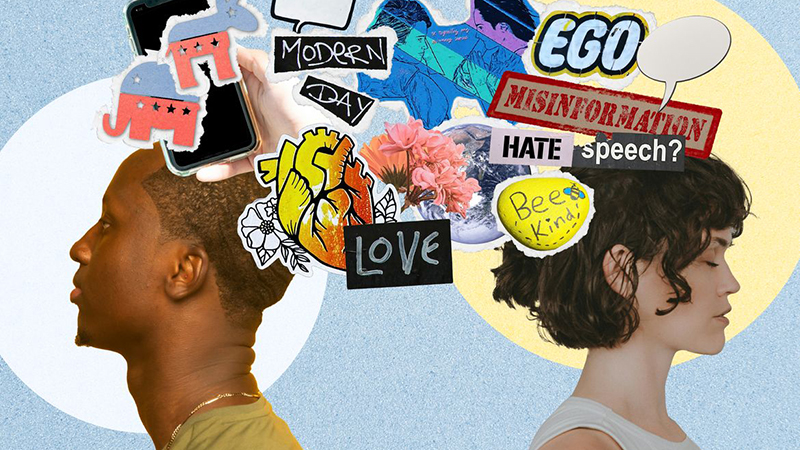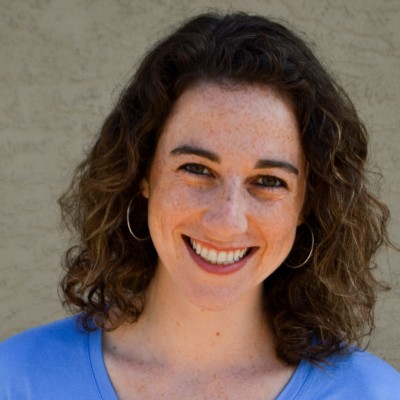UC People: Maia Ferdman, radical optimist
Share This Article

By Lucy Berbeo and Citlalli Chávez-Nava, UCLA Newsroom
On a warm spring afternoon at UCLA, Maia Ferdman is arranging chairs in a circle at the front of an open-plan conference room. Faculty and staff from across campus file in and take their seats, exuding an air of first-day-of-class anticipation.
As deputy director of the UCLA Bedari Kindness Institute and staff director of the UCLA Dialogue across Difference initiative, Ferdman, a Bruin alumna, is leading a workshop called “Speaking Across Conflict” that teaches communication skills for engaging in dialogue about divisive political issues. With calm clarity, she opens by stressing the urgency of this work at a moment when the UCLA community — along with the world beyond campus walls — is grappling with what she calls “the extraordinary divides of our time.”
“This workshop will challenge you to have honest and authentic conversations about controversial topics that many of us often avoid,” Ferdman says, looking around at each participant. “But what we say here is held in confidence. Can we all agree not to share any identifying information about anyone else in the room?”

“It is both a tremendous honor and privilege, and a responsibility, to have the word ‘kindness’ in my job title and to be tasked with this work.”
— Maia Ferdman, deputy director of the UCLA Bedari Kindness Institute and staff director of the UCLA Dialogue across Difference initiative
Creating this space for open, trusting dialogue is more than an act of radical optimism. At a time when toxic polarization is threatening stability at the individual, institutional and national levels, our very survival comes down to the work of connecting with one another in this way Ferdman says. It is a cornerstone of a growing, interdisciplinary movement, anchored in the UCLA College, to create the robust conversation that, in the words of UCLA Chancellor Julio Frenk, can help us move from polarization to pluralism. And it unites all of us around a single, critical question: How can we harness the power of the public university as a force for good in the world?
The science of building bridges
In Ferdman’s line of work, a well-known parable is commonly shared. Three people stand in a darkened room alongside an elephant; each one reaches out and touches a different part of the its body — its trunk, leg or tusk — and tries in vain to describe the animal, mistaking it for a snake, a tree or a piece of marble. When asked about public perception of UCLA’s campus climate after some of our university’s most challenging years to date, Ferdman says this story comes to mind.
“The difference and division we’re perceiving is real, but what we lose in the headlines is a certain level of depth, and we also lose the heart of people,” she says. “Depending on what your life experience is, what corner of campus you’re on and who you’re talking to, your story will be different — and that doesn’t make it untrue, it just makes it incomplete. I think the complete story is a lot messier, more multidimensional, dynamic, paradoxical and hard. And that’s something that we get the privilege of unpacking a little bit more in dialogue.”
“Speaking Across Conflict,” which uses the methodology of the national nonprofit Resetting the Table (see box below), reflects a microcosm of the work that defines Ferdman’s career. Before returning to her alma mater, she served as an intergroup dialogue facilitator, mediator and bridge-builder in the public sector and independently. But her journey to dialogue began much earlier: Growing up in a Jewish Argentinian household in Southern California where Spanish was her first language and discussions about diversity were frequently held at the dinner table, Ferdman learned to navigate a complex identity and communicate between and among different communities.
That lived experience guided her pursuit of dual degrees at UCLA: a bachelor’s in global studies, including experiential learning in intercultural and dialogic communication with UCLA’s Intergroup Dialogue Program, and a master’s in Latin American studies, during which she traced her own family’s multicultural lineage. The journey has come full circle, she says, in her work at the Bedari Kindness Institute.
“It is both a tremendous honor and privilege, and a responsibility, to have the word ‘kindness’ in my job title and to be tasked with this work. Doing this at UCLA, specifically, imbues it with new meaning and new possibility,” Ferdman says. “I am not just hoping to bridge divides in my country or the world, but in a very concrete, bounded yet still large and expansive, community that I care about deeply — a community that helped shape me. And I get a special joy out of telling students that my professional dialogue journey started at UCLA.”
Read more about the Bedari Kindness Institute at the UC Newsroom.
